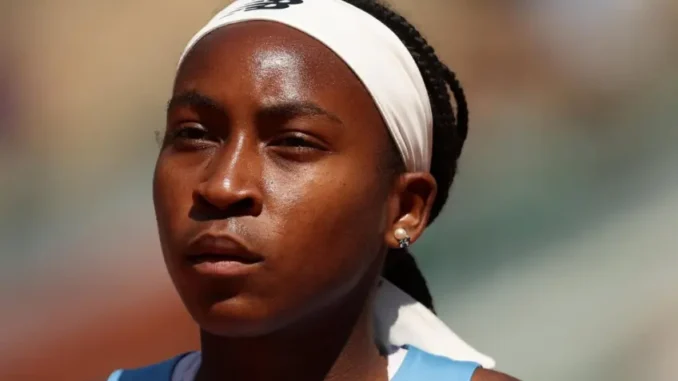
On a sunlit Tuesday at Wimbledon 2025, the tennis world watched in stunned silence as World No. 2 Coco Gauff faced a shocking first-round defeat to Dayana Yastremska. The 21-year-old American, fresh off her second Grand Slam victory at the French Open just weeks prior, entered the All England Club with high expectations. Fans and analysts alike anticipated a deep run on the grass courts, but instead, Gauff’s tournament ended abruptly, leaving her grappling with raw disappointment and emotional exhaustion. “This definitely sucks,” she confessed in a post-match press conference, her voice heavy with frustration.
Gauff’s journey to Wimbledon this year was marked by soaring highs and unforeseen challenges. Her recent triumph in Paris, where she clinched the French Open title, cemented her status as one of tennis’s brightest stars. At just 21, she has already proven her mettle on the global stage, blending powerful groundstrokes with a fierce competitive spirit. However, the transition from the clay courts of Roland Garros to the slick grass of Wimbledon proved daunting. Gauff admitted that the emotional and physical toll of her French Open success left her feeling “mentally overwhelmed.” The rapid shift in surfaces, coupled with the weight of expectations, made it difficult for her to find her rhythm on grass, a surface that has historically posed challenges for her.
The match against Yastremska was a stark departure from Gauff’s usual dominance. Known for her resilience, she appeared uncharacteristically error-prone, struggling with unforced errors and failing to capitalize on key moments. The final scoreline reflected a straight-sets loss, marking Gauff’s earliest Grand Slam exit since her first-round defeat at Wimbledon the previous year. “I just feel a little bit disappointed in how I showed up today,” she said, her words carrying the weight of self-reflection. In the locker room afterward, Gauff admitted to struggling emotionally, grappling with the sting of defeat. “I’m trying to be positive… I don’t like losing,” she told reporters, her voice wavering as she fought back tears.
Grass courts have long been a puzzle for Gauff. Despite her versatility and athleticism, she has yet to advance beyond the fourth round in her six appearances at Wimbledon. The surface demands precision and adaptability, qualities that test even the most seasoned players. For Gauff, the quick turnaround from the clay season left little time to adjust. “Coming off the French Open, I was drained,” she explained, highlighting the mental fatigue that lingered after her Paris victory. The emotional rollercoaster of a Grand Slam win, followed by the pressure to perform at Wimbledon, underscored the relentless demands of professional tennis.
Yet, amidst the heartbreak, Gauff’s candor and vulnerability shone through. In her press conference, she spoke openly about the societal pressure to appear recovered and resilient after a loss. Her honesty resonated with fans, who took to social media to express admiration for her authenticity. Many praised her for acknowledging the emotional toll of defeat, a side of athletes that often remains hidden. “I know you’re just off court from a tough loss, but can you step back and look at your European swing in general?” a reporter asked. Gauff’s response was measured but firm: she was disappointed but determined not to dwell on the loss. “I’m not going to sit here and mope forever,” she said, signaling her intent to regroup and refocus.
The defeat also sparked discussions about the scheduling challenges of the tennis calendar. Gauff’s experience highlights the difficulty of transitioning between surfaces in a condensed season, particularly for younger players still honing their all-court games. Her loss to Yastremska, a talented but inconsistent player, serves as a reminder of the fine margins in professional tennis, where even the best can falter under pressure.
As Gauff reflects on her Wimbledon exit, her focus is already shifting to the future. Known for her work ethic and maturity, she is unlikely to let this setback define her season. With the hard-court season and the US Open on the horizon, Gauff has ample opportunity to reclaim her momentum. Her ability to confront adversity head-on, coupled with her willingness to share her struggles, makes her a compelling figure in the sport. For now, the sting of Wimbledon lingers, but Gauff’s resilience suggests that this heartbreak is merely a chapter in a much larger story of growth and triumph.
Leave a Reply